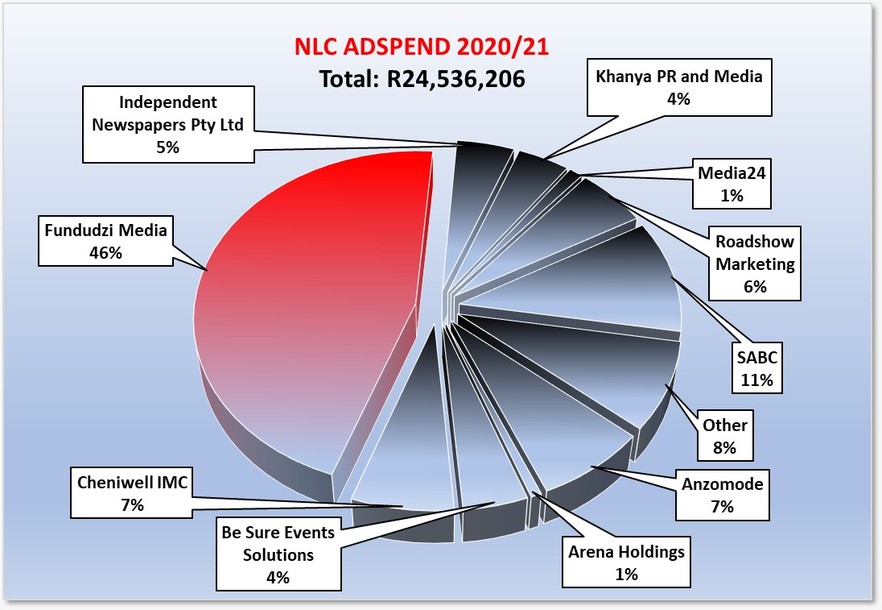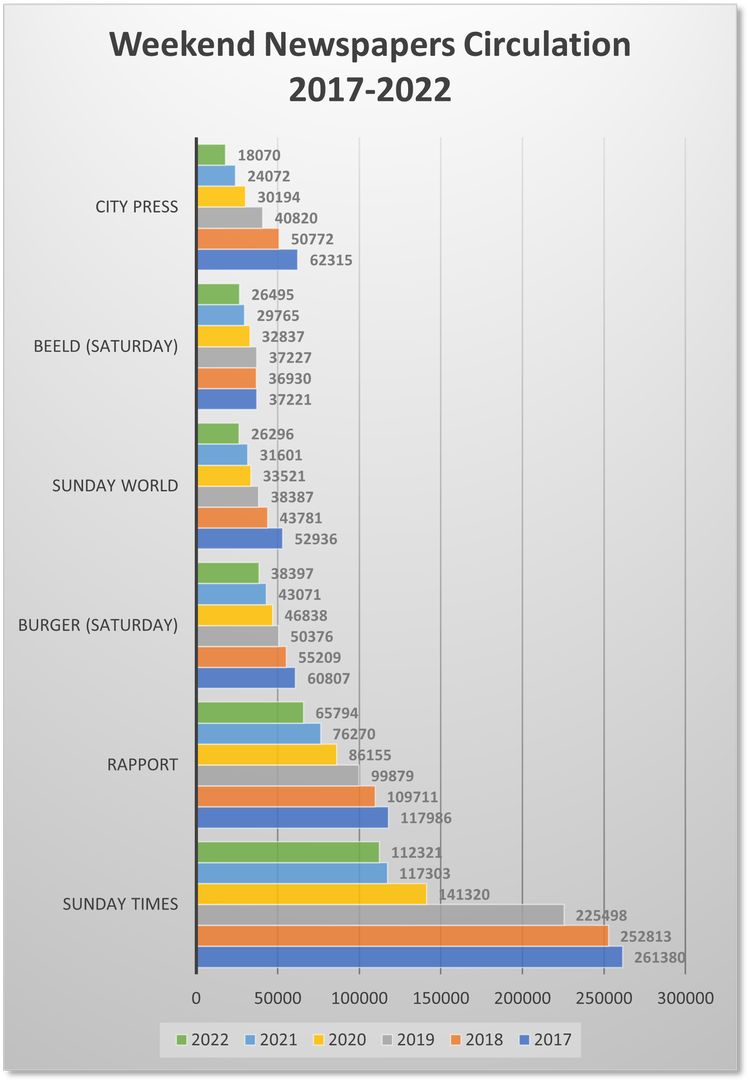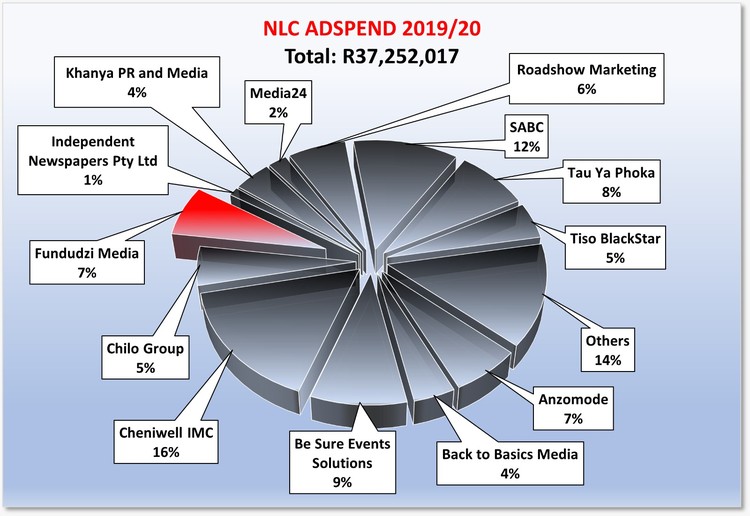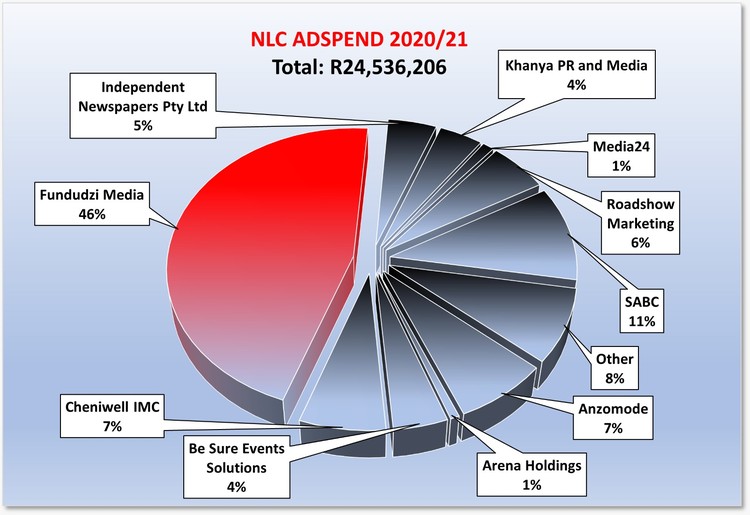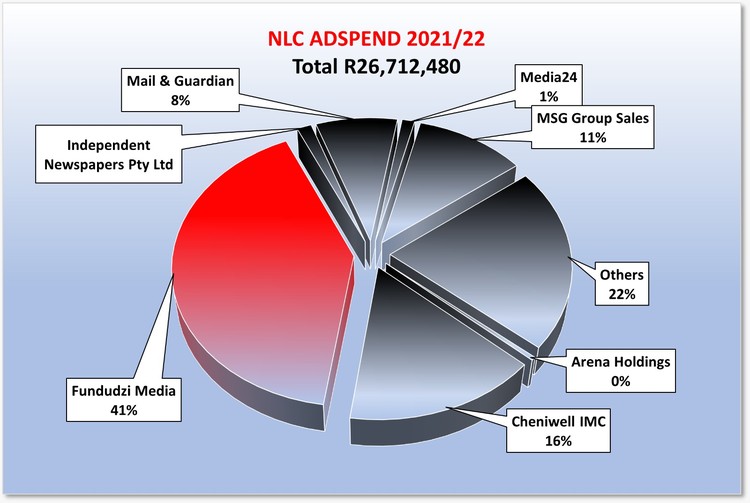Exposed: The Sunday World’s lucrative partnership with the Lottery
The newspaper got millions of rands of Lottery advertising and also ran stories to counter exposés of corruption
In the 2020/21 financial year Fundudzi Media, the owner of Sunday World, received 46% of the National Lotteries Commission’s advertising spend, despite its relatively small weekly circulation.
- Between 2019 and 2022, the National Lotteries Commission spent tens of millions of rands in the media to counter reports exposing corruption in the use of Lottery money.
- By far the biggest chunk of this money went to weekly publication Sunday World.
- Some of these payments have been flagged by the Auditor-General.
- At the same time, Sunday World ran a series of “news” articles giving the NLC and its cronies a platform to counter reports of corruption, including those by GroundUp.
The National Lotteries Commission (NLC) spent tens of millions of rands on advertising and advertorials between 2019 and 2022 to counter reports exposing corruption involving Lottery funds.
A massively disproportionate amount went to one newspaper in particular: Sunday World.
The impact of the increased ad spend is discussed in the NLC’s 2020 annual report. Analysing media reports on the Lottery, the report states:
“In terms of the critical ethical trends/issues that emerged from the analysis, unethical coverage dominated in areas such as fraud, corruption and bribery; scandals; and investigations, while ethical coverage dominated in the area of sponsorships.
“Key findings included the fact that most coverage was dominated by one publication and driven by one journalist from the same online media outlet.”
The “media outlet” and journalist referred to are clearly GroundUp and one of us, Raymond Joseph.
In its 2020 annual report, the NLC stated that 52% of media reports portrayed the NLC as ethical. A year later, according to the NLC’s own analysis, this had risen to 57%. These media reports include the paid-for sponsorships with a positive spin.
The increased advertising expenditure went mainly to a few media houses. Advertising in other media was slashed, including advertising on the state-owned SABC, which has a deep footprint in rural areas, where many of the NLC’s projects are situated.
By far the biggest recipient of this increased ad spend was Sunday World, which received about R24.7-million in three years (2020-2022) from the NLC for adverts and advertorials.
This came after the newspaper was saved from closure after it was bought by property developer David Mabilu. Mabilu “made millions by buying land from one arm of government and reselling it to another” according to a 2011 report by the Mail and Guardian.
While Sunday World had struggled to become financially viable under its previous owners Tiso Blackstar (now Arena Holdings) it seems to have fared much better under its new owner, Mabilu’s Fundudzi Media, in part because of the advertising boost from the NLC.
Battle for advertisers
In the 2019/20 financial year, the first year in which Fundudzi Media was in charge, it was revealed in Parliamentary questions and answers that the NLC spent just over R2.5-million (roughly 7% of its advertising budget) with Sunday World.
The next year, 2020/21, its spending with Sunday World increased to R11.2-million, which was 46% of the NLC’s media spend. And, in the 2021/22 financial year, Sunday World invoiced the NLC for R10.9-million, which represented 41% of the NLC’s total media spend.
The spending at one relatively small media company was later flagged by the Auditor-General. But at the time the NLC defended its decision not to follow a procurement process, arguing that only Sunday World provided the required target market.
How only the Sunday World would fit the profile was never clear, seeing that the newspaper’s readership demographics were not unusual and its footprint did not comprehensively cover the whole of the country. A 2019 Publisher Audience Measurement Survey (PAMS) indicates that 51% of the newspaper’s readers fall in the more affluent Living Standards Measure (LSM) 6-7 readership category, like several other publications. The Sunday World’s main distribution area at the time was Gauteng (76%).
In 2021, when the NLC spent almost half of its media budget on Sunday World, the paper had an average weekly circulation of 31,601 according to ABC. By comparison, the top-selling Sunday paper at the time was the Sunday Times, with an average weekly circulation of 117,303. By the end of 2022, Sunday World’s weekly circulation had fallen to an average of 26,296 for the year.
Compiled using Audit Bureau of Circulations (ABC) data
Advertising analysis
A GroundUp analysis of mid-2021 editions of Sunday World found that the average ad loading — the ratio of adverts compared to news content — was roughly 17%. The accepted industry measure for weekend tabloids is about 30% adverts and 70% news, with special supplements being used to subsidise the news.
An ad-loading percentage of 17% is very low and means that the publisher is highly dependent on fewer advertisers to pay the bills.
In the case of Sunday World, the main advertisers were government or government-controlled entities. These included various municipalities and national and provincial government departments, Telkom and the University of Johannesburg. The paper also had a few “commercial” advertisers.
According to the 2020 rate card of Sunday World, a full-colour full-page advert would have cost about R92,000 for a single placement in the main body of the paper. Placement in the front of the paper, for example on page 3, attracts an additional 50% “loading” in the cost.
In 2021 Sunday World announced a 55% increase in tariffs, with the cost of a full-colour full-page ad increasing to just over R142,000.
This increase went against the trend, with most other newspapers keeping their rates the same or, in some cases dropping prices to attract advertising.
Based on answers to written parliamentary questions and leaked Auditor-General management reports, Sunday World charged the NLC its full rate card prices.
Making a rough estimate of a newspaper’s income, based on advertising, is not too complicated and involves counting the number of adverts, calculating their sizes and using the publication’s rate card to determine income.
Based on an analysis of four months’ editions and assuming all advertisers paid the full price, as well as the “loading fee” for prime placement — which is very seldom the case — Sunday World had an average advertising income of roughly R517,105 per edition, excluding VAT, during this period.
That would result in an annual turnover of about R26.9-million, presuming that the paper was published 52 weeks of the year.
These three graphs show how Fundudzi Media’s share of advertising expenditure grew after 2019/20. These figures are from questions and answers in Parliament.
Questions in Parliament
The NLC spent R11.2-million in the 2020/21 financial year with Fundudzi Media, according to answers to parliamentary questions. This means that Sunday World relied on one advertiser for about 40% of its estimated advertising income.
And, based on leaked documents, it is also clear that the NLC was not negotiating any discounts with Sunday World. An NLC eight-page special report on “Regulatory and Funding Impact”, for example, was booked to appear on 25 October and 15 November 2020 in the Sunday World. The NLC was quoted R866,087 per insertion, with two insertions costing R1,732,174 excluding VAT.
Responding to questions by Democratic Alliance MP Mat Cuthbert, the Minister of Trade, Industry and Competition Ebrahim Patel said: “A number of transactions of the NLC have been flagged by the Auditor-General. This follows a letter addressed by the Ministry to the Auditor-General, drawing attention to findings of the SIU.”
Patel said: “The NLC advised that the adverse findings made by the Auditor-General will be investigated and disciplinary steps taken.”
The response lists the payments for advertising and advertorial made to Fundudzi Media.
Fundudzi Media/Sunday World transactions are indicated as being “single source” meaning they were not subjected to a competitive bidding process.
“These transactions have since been declared as irregular expenditure by the [Auditor-General] on the basis that it was not impractical for the NLC to obtain three quotations for those below R500,000 and that the transactions above R500,000 should have been procured through a competitive bidding process or deviation approved by the National Treasury and not by the [NLC] Commissioner,” Patel said.
He said the NLC was currently “undertaking a determination exercise on these transactions as required by the National Treasury framework” and steps would be taken “against all that have been found to be in contravention of the supply chain regulations”.
In response to detailed questions sent to Mabilu, GroundUp received a lawyer’s letter from an attorney acting for both the paper and Mabilu.
“Our clients hereby demand that you refrain from publishing any of the unfounded allegations that form a part [of] your questions as they are malicious and defamatory,” attorney Bongani Khoza wrote.
“Our clients reserve their right to litigate against you for damages should you proceed to publish the defamatory article,” he warned.
He also said questions about why the NLC spent what it did with Sunday World should be directed to the NLC.
GroundUp has reliably learnt that the payments to Sunday World form part of an investigation commissioned by the new executive and board of the NLC into spending on media.
Fighting on all fronts
But Sunday World did more than run paid-for advertising for the NLC. It also used its print, online and social media editorial platforms to publish content defending the NLC.
Some of the stories published on the Sunday World’s website amplified NLC falsehoods about GroundUp and Raymond Joseph and disputed GroundUp stories.
Our investigation found poorly written and barely edited NLC media releases that were published on Sunday World’s website as “news” or “breaking news”.
An example of this is a Sunday World story in July 2021 that appeared after GroundUp published a story about how law firm Ndobela Lamola Incorporated – which was associated with Justice and Correctional Services Minister Ronald Lamola – had bungled a disciplinary inquiry involving former NLC chief operating officer Phillemon Letwaba.
Much of Sunday World’s story, designated as “news”, is a verbatim repeat of a joint media statement put out by Ndobela Lamola Inc and the NLC.
Both Sunday World’s story and the statement end with “All rights remain reserved”, an unusual ending to a news story.
Another example, again presented as “news” and written by journalist Boitumelo Kgobotlo in February 2020, was based on an African Transformation Movement statement defending Letwaba. Letwaba resigned shortly before he was to face a disciplinary inquiry on charges of abusing his position to enrich himself, his family and cronies.
Kgobotlo also sent Raymond Joseph a series of bizarre questions in October 2019 based on questions that Joseph had sent to Ebrahim Patel’s former spokesperson, Sidwell Medupi. (It’s unclear how Kgobotlo got hold of Joseph’s questions.)
She also sent a series of questions in 2019 to Derek Carelse, the managing director of The Big Issue, a Cape Town-based non-profit job creation publication of which Raymond Joseph was once an unpaid director, and from which he resigned in 2016.
“The NLC seem to be suggesting that Mr Joseph is using the publishing platform [GroundUp] to settle his personal score against the NLC, as someone who was sulking after the NLC ceased funding your NGO in which he is a director,” Kgobotlo told Carelse.
This was a lie that the former executive of the NLC executive and board had pushed to deflect attention from GroundUp’s reporting about Lottery corruption.
And when GroundUp revealed how attorney Lesley Ramulifho had used Lottery funds meant for a drug rehabilitation centre to buy a luxury home, Sunday World leapt to his defence.
Describing Ramulifho as a “top legal eagle”, the story by journalist Aubrey Mothombeni in November 2019 trashed GroundUp’s reporting and repeated falsehoods spread by Ramulifho and the NLC. As was often the case, no right of reply was sought from GroundUp.
Mothombeni, who wrote several of Sunday World’s NLC stories, resigned while facing a disciplinary hearing in 2021 after he tried to solicit a R1-million bribe to kill a story.
Another example of Sunday World’s dodgy reporting involving the NLC is a story in May 2021 based on a poorly-written, forged statement riddled with grammatical errors, supposedly from South African Non-Profit Organisation Union (SANPOU) president Thapelo Ntlele.
Sunday World wrote: “In a leaked letter, the union states that some individuals from a popular news publication in the Western Cape had previously tried to bribe union members to ‘act’ against the NLC, but the union turned down the offer.”
This was apparently a reference to GroundUp, and false.
Ntlele, who has accused the NLC of corruption and unfairness, told GroundUp that the statement was a “forgery” and that Standard Bank account details for donations included in it were “fake”. “We bank with FNB,” he said.
He also sent GroundUp a series of questions posed to him by Sunday World reporter Bongani Mdakane. Several were about GroundUp including: “It is alleged that your organization is being used by GroundUp, a media organization based in Cape Town to fight its battles against the NLC, how true is this?” Another one asked: “Did GroundUp pay SANPOU to fight NLC?”
This was exactly the line that the NLC was pushing in order to deflect from GroundUp’s reporting on Lottery corruption.
There were also puff pieces, like one published in December 2020 showcasing the NLC’s approach to preventing conflicts of interest. Another published in April 2021 is clearly an NLC advertorial but not marked as one. Instead it’s marked as news.
The above pattern appeared to start in 2019 when Makhudu Sefara became editor of Sunday World. He later left and is now editor of TimesLive and deputy-editor of the Sunday Times. Asked to comment, Sefara responded with an insulting email.
The attacks came to an end several months after veteran editor Wally Mbhele took over the reins in January 2021. Mbhele made a concerted effort to improve ethics at the paper. Rather than automatically defending the NLC, under Mbhele, Sunday World eventually began reporting on the corruption at the NLC, like this story in March 2022 about how NLC officials illegally benefitted from Lottery funds. But Sunday World continued promoting the NLC based on media releases and advertorials as news.
Mbhele eventually left earlier this year after he came into conflict with Mabilu.
He declined to comment for this article.
The events described here happened under the NLC’s previous executive. The NLC has a new board, new commissioner and new management since then, and initial signs are that it is now committed to running a clean shop.
See also:
- Is the National Lotteries Commission countering media exposés with advertising? (published in 2019)
- Does Sunday World want to do journalism or be a defender of corruption? (published in 2019)
Support independent journalism
Donate using Payfast

Don't miss out on the latest news
We respect your privacy, and promise we won't spam you.
Next: MyCiTi the focus of Cape Town’s new public transport business plan
Previous: Big cats among victims as snare trapping spreads in Western Cape
© 2023 GroundUp. This article is licensed under a Creative Commons Attribution-NoDerivatives 4.0 International License.
You may republish this article, so long as you credit the authors and GroundUp, and do not change the text. Please include a link back to the original article.
We put an invisible pixel in the article so that we can count traffic to republishers. All analytics tools are solely on our servers. We do not give our logs to any third party. Logs are deleted after two weeks. We do not use any IP address identifying information except to count regional traffic. We are solely interested in counting hits, not tracking users. If you republish, please do not delete the invisible pixel.

